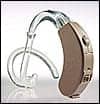December 12, 2007
A new Brandeis University study of twins shows that genes play a significant role in hearing loss experienced by baby boomers and their parents. The research, published in the latest issue of the Journal of Gerontology: Medical Sciences, studied genetic and environmental factors affecting hearing loss.
The study examined 179 identical and 150 fraternal male twin pairs, ranging in age from 52 to 60 years, as part of the Viet Nam Era Twin Study of Aging (VETSA). About two thirds of the hearing loss in the individual subjects’ better ears could be attributed to genetic factors.
"The research suggests that baby boomers whose parents have a hearing loss may well have a similar hearing loss." says Sergei Kochkin, executive director of the Better Hearing Institute (BHI). "My message to baby boomers is this: The best present you can give your parents this holiday season is to take them to get their hearing checked… And the best present you can give your spouse and children? Get your own hearing checked at the same time."
"This research confirms the importance of genetic factors in age-associated hearing loss, and the need for vulnerable individuals and their families to take extra care to prevent further hearing damage," says lead author Brandeis neuroscientist Arthur Wingfield.
Wingfield, who BHI reports is an expert on the relationship between memory performance and hearing loss in older adults, says that even mild hearing loss can indirectly lead to declines in cognitive performance because intellectual energy normally reserved for higher-level comprehension must be directed toward perceptual effort for accurately hearing speech.
Hearing loss is the third most common chronic disability among older adults after arthritis and hypertension, according to BHI, which states hearing loss can strike at any time and at any age. The organization indicates numerous studies have linked untreated hearing loss to physical and emotional conditions, such as irritability, negativism, anger, fatigue, tension, stress, depression, avoidance or withdrawal from social situations, social rejection and loneliness, all of which can be exacerbated during holiday gatherings.
Source: Better Hearing Institute


